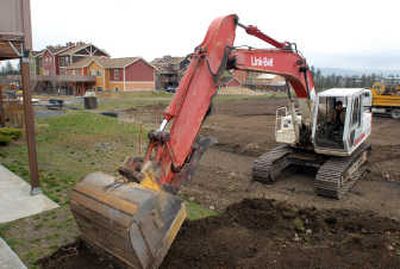Here’s the dirt : Riverwalk II begun

Low-income renters, including those with disabilities and large families, will have more available housing after the expansion of a Spokane County apartment complex designed to be both affordable and sustainable.
Nonprofit Spokane Neighborhood Action Programs broke ground Monday on a second, 51-unit phase of Riverwalk Point, its low-income apartment complex off Upriver Drive east of Spokane.
Riverwalk Point II will offer apartments with one, two and three bedrooms to people making 30 percent to 50 percent of the area’s median income, said Holly Martin, SNAP’s housing services coordinator. Two-bedroom units will cost $388 to $647 a month, including utilities, depending on income. Three-bedroom apartments will cost $450 to $748 a month.
Ten units each will be reserved for homeless residents, the disabled and families with six or more members.
“We find that all three of those are difficult to house,” Martin said. “There’s always a need.”
A community building will house a computer lab, social services office and space for life-skills classes.
The $8.6 million project, funded in part by federal tax credits and grants, should be completed by March 2009, with some buildings opening sooner, she said.
The expansion nearly didn’t happen. Washington’s Housing Trust Fund in 2005 denied SNAP’s application for expansion.
Later, there was so much demand for tax credits, the project’s main funding source, that SNAP’s application was denied. But it received about $5.68 million in credits that had been destined for areas that didn’t use them, Martin said. It also received donations from Spokane County, the Housing Trust Fund and the Bill & Melinda Gates and Paul G. Allen Family foundations, among others.
Fifty-two-unit Riverwalk Point I, built in 2002, won national awards for its design, construction and financing. It’s completely full, Martin said.
Like the project’s first phase, 5008 E. Buckeye Ave., the five buildings will incorporate a variety of sustainable building techniques, such as heated concrete floors, water-conserving fixtures and a solar water heater on one building. In some places, builders will use asphalt roof shakes as shingles, which Martin said should never need to be painted or replaced. The community building will bear solar panels, “so in the summer we should see our electric meter going backwards,” she said.
Martin estimates the efforts will increase costs by just 1 percent.
“When people are saying it’s too expensive to build, well, it isn’t,” she said. “It’s about really thinking it through.”
Starting this fall, Housing Trust Fund funding recipients must build to the state’s new Evergreen Sustainable Development Standard, “green” building criteria mandated by Washington law.
“We’re just doing it ahead of time,” Martin said, adding she worries contractors and architects will have a steep learning curve.
SNAP has been doing affordable housing developments since about 1993, Martin said.
Consignment furniture store opens
After shuttering their long-standing antique store in December, the occupants of a historic Monroe Street building have found a new niche: furniture on consignment.
Chris and Tery Garras, formerly of Monroe Street Bridge Antique Market, on Tuesday opened the doors to Metro Home Furniture on Consignment. Their selection of an estimated 150 pieces of furniture is housed in a 101-year-old building, 604 N. Monroe St., owned by the Garras family since 1948, Tery Garras said.
Wares range from a 1936 jukebox to a mid-1800s buffet and a Danish teak bed that sold the first day.
While the antique shop had competed with other area stores, it was online auction site eBay that “really has put a hurt on antiques” dealers, Tery Garras said. The site allows people to figure out the value of their objects and sell them outside an antique store.
“It’s not a growing market” for antiques, she said. “We want to keep this business viable.”
The couple two years ago started talking with RenCorp LLC, developer of Spokane condo projects such as Railside Center and The Edge, about transforming the three-story building’s upper floors into condominiums, some with a view of the Spokane River. But with the condo market experiencing a slowdown, they are willing to wait.
“We want to just take it day by day and see what happens,” she said.